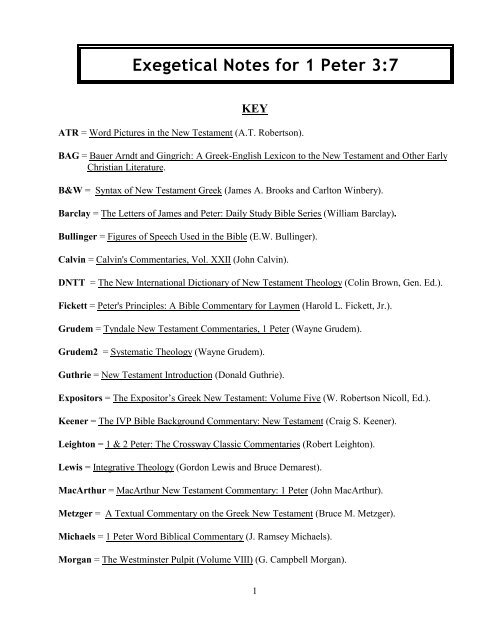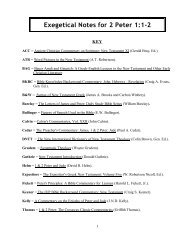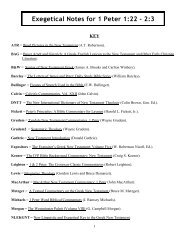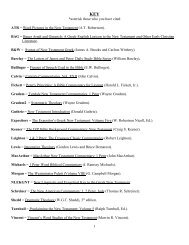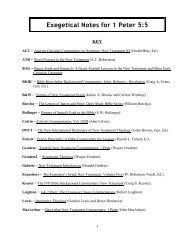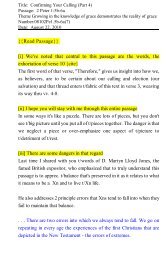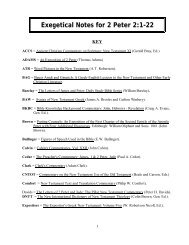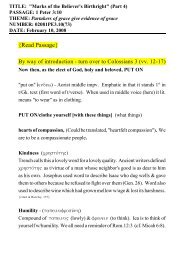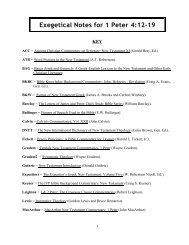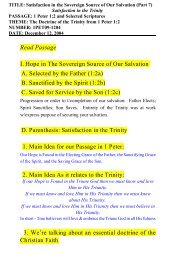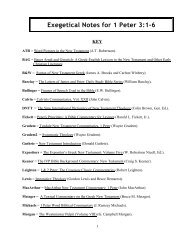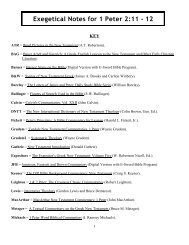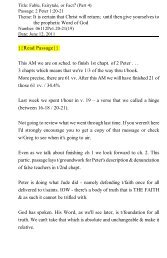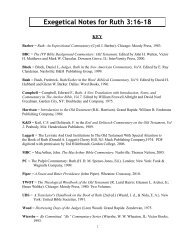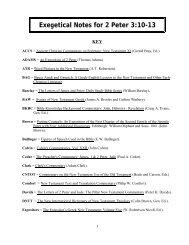Exegetical Notes for 1 Peter 3:7 - Tony Bartolucci Dot Com
Exegetical Notes for 1 Peter 3:7 - Tony Bartolucci Dot Com
Exegetical Notes for 1 Peter 3:7 - Tony Bartolucci Dot Com
Create successful ePaper yourself
Turn your PDF publications into a flip-book with our unique Google optimized e-Paper software.
<strong>Exegetical</strong> <strong>Notes</strong> <strong>for</strong> 1 <strong>Peter</strong> 3:7<br />
KEY<br />
ATR = Word Pictures in the New Testament (A.T. Robertson).<br />
BAG = Bauer Arndt and Gingrich: A Greek-English Lexicon to the New Testament and Other Early<br />
Christian Literature.<br />
B&W = Syntax of New Testament Greek (James A. Brooks and Carlton Winbery).<br />
Barclay = The Letters of James and <strong>Peter</strong>: Daily Study Bible Series (William Barclay).<br />
Bullinger = Figures of Speech Used in the Bible (E.W. Bullinger).<br />
Calvin = Calvin's <strong>Com</strong>mentaries, Vol. XXII (John Calvin).<br />
DNTT = The New International Dictionary of New Testament Theology (Colin Brown, Gen. Ed.).<br />
Fickett = <strong>Peter</strong>'s Principles: A Bible <strong>Com</strong>mentary <strong>for</strong> Laymen (Harold L. Fickett, Jr.).<br />
Grudem = Tyndale New Testament <strong>Com</strong>mentaries, 1 <strong>Peter</strong> (Wayne Grudem).<br />
Grudem2 = Systematic Theology (Wayne Grudem).<br />
Guthrie = New Testament Introduction (Donald Guthrie).<br />
Expositors = The Expositor’s Greek New Testament: Volume Five (W. Robertson Nicoll, Ed.).<br />
Keener = The IVP Bible Background <strong>Com</strong>mentary: New Testament (Craig S. Keener).<br />
Leighton = 1 & 2 <strong>Peter</strong>: The Crossway Classic <strong>Com</strong>mentaries (Robert Leighton).<br />
Lewis = Integrative Theology (Gordon Lewis and Bruce Demarest).<br />
MacArthur = MacArthur New Testament <strong>Com</strong>mentary: 1 <strong>Peter</strong> (John MacArthur).<br />
Metzger = A Textual <strong>Com</strong>mentary on the Greek New Testament (Bruce M. Metzger).<br />
Michaels = 1 <strong>Peter</strong> Word Biblical <strong>Com</strong>mentary (J. Ramsey Michaels).<br />
Morgan = The Westminster Pulpit (Volume VIII) (G. Campbell Morgan).<br />
1
NLEKGNT = New Linguistic and <strong>Exegetical</strong> Key to the Greek New Testament.<br />
Schreiner = The New American <strong>Com</strong>mentary: 1, 2 <strong>Peter</strong>, Jude (Thomas R. Schreiner).<br />
rd<br />
Shedd = Dogmatic Theology (W.G.T. Shedd), 3 edition.<br />
Kittle = Theological Dictionary of the New Testament (G. Kittle and G. Friedrich, Eds.).<br />
Turnbull = Proclaiming the New Testament: Volume 5 (Ralph Turnbull, Ed.).<br />
Vincent = Vincent’s Word Studies of the New Testament (Marvin R. Vincent).<br />
Wuest = First <strong>Peter</strong> in the Greek New Testament (Kenneth S. Wuest).<br />
2
Diagram of 1 <strong>Peter</strong> 3:7<br />
<br />
<br />
<br />
<br />
<br />
<br />
<br />
<br />
Husbands, likewise,<br />
live with [your wives]<br />
according to knowledge,<br />
as with a weaker vessel–<br />
since she is woman–<br />
and grant her honor<br />
as a joint heir of the grace of life,<br />
so that your prayers might not be hindered.<br />
4
GREEK TEXT:<br />
TRANSLATION, OUTLINE AND CENTRAL PROPOSITION<br />
<br />
<br />
ENGLISH TRANSLATION:<br />
Husbands, likewise, live with [your wives] according to knowledge, as with a weaker vessel–since<br />
she is the woman–and grant her honor as a co-heir of the grace of life, so that your prayers might<br />
not be hindered.<br />
PASSAGE OUTLINE:<br />
I. Instructions to Husbands in the Church<br />
A. Life with your wife according to knowledge<br />
1. Recognize that she is a weaker vessel, a woman<br />
B. Grant her honor as a joint heir of eternal life<br />
II. Promise to Husbands in the Church<br />
A. Your prayers will not be hindered<br />
INITIAL SERMON OUTLINE:<br />
I. Call<br />
II. <strong>Com</strong>mand<br />
III. Consideration<br />
IV. <strong>Com</strong>mendation<br />
IV. Consequence<br />
PASSAGE SUBJECT/THEME (what is the passage talking about): The behavior of a husband<br />
toward his wife.<br />
PASSAGE COMPLEMENT/THRUST (what is the passage saying about what it’s talking about):<br />
the husband is to treat his wife with understanding and as a joint heir to eternal life so that his prayers<br />
are not hindered.<br />
PASSAGE MAIN IDEA (central proposition of the text): A husbands must treat his wife as a<br />
spiritual equal, with tenderness, so this his prayers are not hindered.<br />
5
PURPOSE OF THE SERMON (on the basis of the CPT what does God want us to learn and do?):<br />
God wants the Christian husband to treat his wife with honor as a spiritual equal, keeping in mind that<br />
she is woman, so that his prayer life is not interrupted.<br />
SERMON SUBJECT/THEME (what am I talking about): How husbands are to treat their wives.<br />
SERMON COMPLEMENT/THRUST (what am I saying about what I am talking about): With<br />
consideration toward her creation as a woman and fellow heir to salvation.<br />
INITIAL CENTRAL PROPOSITION OF THE SERMON: Treat your wife with consideration as<br />
God's creation and a Christian or He will consequently not hear you when you call.<br />
MEMORABLE CENTRAL PROPOSITION OF THE SERMON: Consistent communion with<br />
Christ is a consequence of caring <strong>for</strong> your wife with consideration as God's co-equal creation.<br />
"Take heed of your wife or God won't take heed of you."<br />
SERMONIC IDEA/TITLE: "The Pleasure of God's Face: How to Honor Your Wife"<br />
FINAL SERMON OUTLINE:<br />
I. The Pleasure of God's Face: How to Honor Your Wife<br />
A. Hear the Call - "Husbands likewise"<br />
B. Heed the <strong>Com</strong>mand - "Treat your wife according to knowledge"<br />
C. Have Consideration - "Since she is a woman"<br />
D. Honor her Conversion - "Grant her honor as a co-heir"<br />
1. Happy Consequence - "So that your prayers be not hindered"<br />
6
Three Steps of Exegesis<br />
Do an initial translation of the entire passage.<br />
Do a detailed analysis of the grammar, working verse-by-verse to the end of the<br />
passage.<br />
Do a detailed exegesis of the passage by way of a "shot-gun" approach, using all the<br />
exegetical tools.<br />
In no particular order:<br />
Work from critical commentaries to practical.<br />
Word studies and cross-references (analogy of the faith).<br />
Applicational analysis - applicational issues arising from the text.<br />
Theological analysis - theological issues arising from the text.<br />
"Blast away" at the passage until I am content with my exegesis, main idea,<br />
and outline.<br />
Smooth away all of the wrinkles.<br />
The process is to yield an accurate "statue" as I chisel away the debris.<br />
Parsing Verbs and Declining Nouns<br />
Verbs:<br />
Nouns:<br />
Participles:<br />
Adjectives:<br />
( - to follow * Verb: Aorist Subjunctive Active, 2P).<br />
( * Verb: Future Indicative Active, 2P).<br />
( - model, pattern, example * Noun: Masculine<br />
Accusative Singular).<br />
( * Present Middle/Passive Participle: Masculine<br />
Nominative Plural).<br />
( - gentle, kind * Adjective: Masculine Dative Plural).<br />
7
HISTORICAL/CULTURAL/GRAMMATICAL CONTEXT<br />
This verse concludes the section on marriage, begun in verse 1, as well as the greater section on<br />
submission to authority that was begun in 2:13.<br />
The reason (or one reason) why <strong>Peter</strong> gives only one verse to husbands and six to the wives is that his<br />
focus has been on those who are subject to authority, not to those who wield it. It is always more<br />
difficult, as far as attitude is concerned, to submit than to lead. Additionally, <strong>Peter</strong> was focused on wives<br />
with unsaved husbands (difficult!) while in verse seven he addresses husbands with regenerate wives.<br />
8
3:7 EXEGESIS<br />
GREEK TEXT:<br />
<br />
<br />
( – * Noun: Masculine Nominative Plural). Vocative of direct address.<br />
( * Adverb).<br />
(- to dwell together * Present Active Participle: Masculine Nominative Plural).<br />
Adverbial-Imperatival Participle.<br />
( * Noun: Feminine Accusative Singular). Accusative of Direct Object.<br />
(– like, as, even as * comparative particle).<br />
( * Adjective: Neuter Dative Singular).<br />
( - vessel * Noun: Neuter Dative Singular). Dative-Instrumental of Association.<br />
"Vessel” was a common Greek metaphor <strong>for</strong> “body” since Greeks thought of souls living<br />
temporarily in bodies." Cf. 1 Thess. 4:4; Acts 9:15; Rom. 9:22-23.<br />
(- pertaining to a female or wife * Adjective: Neuter Dative Singular). Not<br />
a noun but an adjective agreeing with vessel and weaker. Attributes of the vessel.<br />
( - to assign or portion out * Present Active Participle: Masculine Nominative<br />
Plural). Adverbial Circumstantial Participle. Perhaps Temporal ("while")?<br />
( * Noun: Feminine Accusative Singular). Accusative of Direct Object.<br />
(– like, as, even as * comparative particle).<br />
( - a joint or fellow heir * Noun: Feminine Dative Plural). Dative<br />
of Indirect Object.<br />
(– * Noun: Feminine Genitive Singular). Genitive of Description.<br />
(– * Feminine Genitive Singular). Genitive of Description.<br />
( - to cut off, to impede one's way, interruption * Verb: Present<br />
Infinitive Passive, 2P). Infinitive of Purpose. Cf. use of the same word in Gal. 5:7 and 1<br />
Thess. 2:18. Idea of "cutting" as in cutting a line of communication (as in a telephone).<br />
( * Noun: Feminine Accusative Plural). Accusative of Direct Object.<br />
( * Second Person Independent Personal Pronoun: Genitive Plural).<br />
ENGLISH TRANSLATION:<br />
Husbands, likewise, live with [your wives] according to knowledge, as with a weaker vessel–since<br />
she is the woman–and grant her honor as a co-heir of the grace of life, so that your prayers might<br />
not be hindered.<br />
CONTEXTUAL, GRAMMATICAL, THEOLOGICAL, APPLICATIONAL ANALYSIS:<br />
Husbands, likewise, ()<br />
9
A. Hear the Call - "Husbands likewise"<br />
( – * Noun: Masculine Nominative Plural). Vocative of direct address.<br />
( * Adverb). Brings us back to the greater context of 2:13 ff. Husbands are duty-bound<br />
to their wives. This does not mean, however, that husbands are to submit to their wives in the same way<br />
that the other groups are addressed (rulers, servants, wives). "The connection is loose, indicating that<br />
a nwe group is addressed." [Schreiner, 159]<br />
In this particular passage, this is the only admonition to the greater; <strong>Peter</strong> doesn't address political leaders<br />
(but he does their subjects), he doesn't address masters (but he does servants). He addresses wives in<br />
vv. 1-6 and he does turn his attention toward the husband in v. 7. There's a connection of submission<br />
that extends to the husbands here in that he is to subject himself to God (cf. 1 Cor. 11:3). That<br />
connection is seen at the end of this verse. If he does not subject himself to God in his care <strong>for</strong> his wife,<br />
God will not attend to his prayers. <strong>Com</strong>munion with God is hindered.<br />
live with your wives according to knowledge, ()<br />
B. Heed the <strong>Com</strong>mand - "Treat your wife according to knowledge"<br />
(- to dwell together * Present Active Participle: Masculine Nominative Plural).<br />
Adverbial-Imperatival Participle. Imperative in <strong>for</strong>ce. Word implies intimacy.<br />
This is a term of intimacy. Idea of "co-habit" (habitat, Latin cohabitent) – but, of course, in<br />
marriage. <strong>Com</strong>mand is to live w/your wife, not w/someone you're not married to. Whenever you<br />
live w/someone, even if it's a college roommate, there are challenges. How much more so in the<br />
union of husband and wife where the two become one. Need <strong>for</strong> unity, love, understanding,<br />
<strong>for</strong>giveness. Cf. Psalm 133:1.<br />
Dwelling in intimacy. Being considerate of your wife's needs: emotionally, physically, spiritually.<br />
( * Noun: Feminine Accusative Singular). Accusative of Direct Object.<br />
Note the other translations (understanding way, considerately or with consideration). Helpful, but misses<br />
the nuance of "knowledge." NASB translates the word as "k." or "knowing" in the 26 of the 27 vv.<br />
where it is found (this the only exception).<br />
The word is important. This is a knowledge of truth; intimate, personal, knowledge.<br />
LUK 1:77 To give to His people {the} knowledge of salvation By the <strong>for</strong>giveness of their sins,<br />
LUK 11:52 "Woe to you lawyers! For you have taken away the key of knowledge; you did not<br />
enter in yourselves, and those who were entering in you hindered."<br />
ROM 11:33 Oh, the depth of the riches both of the wisdom and knowledge of God! How<br />
unsearchable are His judgments and unfathomable His ways!<br />
2CO 2:14 But thanks be to God, who always leads us in His triumph in Christ, and manifests<br />
through us the sweet aroma of the knowledge of Him in every place.<br />
10
PHI 3:8 More than that, I count all things to be loss in view of the surpassing value of knowing<br />
Christ Jesus my Lord, <strong>for</strong> whom I have suffered the loss of all things, and count them but rubbish<br />
in order that I may gain Christ,<br />
COL 2:3 in whom are hidden all the treasures of wisdom and knowledge.<br />
Some commentators see in this an exhortation to a knowledge of God's will. IOW - this isn't knowing<br />
your wife, but knowing God's will in your marriage (so Schreiner). I'm going to go with the majority<br />
and say that this is a knowledge of your wife (context seems to support this - she is a co-heir, a weaker<br />
vessel).<br />
Gill sees various aspects at work:<br />
". . . according to knowledge; of themselves, and their wives, and the duties belonging to the<br />
conjugal state, and the laws of God and man respecting it; and according to their knowledge of<br />
the Gospel, and the Christian dispensation, which no ways breaks in upon, but strengthens and<br />
encourages to the observance of things belonging to natural religion, and civil life; and according<br />
to that superior knowledge of things, which, generally speaking, men have to women; as also<br />
wisely, prudently, becoming their characters as men and Christians . . ."<br />
What "k.?" General knowledge of the fact that she is a woman and thus has unique needs. Specific<br />
knowledge of her desires, goals, frustrations, strengths, weaknesses. Her emotional, physical and<br />
spiritual needs.<br />
"An ef<strong>for</strong>t has been underway . . . to prove that men and women are identical, except <strong>for</strong> the<br />
ability to bear children. Radical feminists have vigorously (and foolishly asserted that the only<br />
distinction between the sexes is culturally and environmentally produced. Nothing could be<br />
farther <strong>for</strong>m the truth; males and females differ biochemically, anatomically, and emotionally.<br />
In truth, they are unique in every cell of their bodies, <strong>for</strong> men carry a different chromosomal<br />
pattern than women. There is also considerable evidence to indicate that the hypothalamic<br />
region, located just above the pituitary gland in the mid-brain, is 'wired' very uniquely <strong>for</strong> each<br />
of the sexes. Thus, the hypothalamus (known as the seat of the emotions) provides women with<br />
a different psychological frame of reference than that of men." [James Dobson, What Wives<br />
Wish Their Husbands Knew About Women, 114] .<br />
In the early 1990's author John Grey published a best selling book entitled, "Men are from Mars, Women<br />
are From Venus."<br />
Each one of us men could get together and talk about our wives and outline specific differences<br />
that characterize each one as to their needs. One wife may be especially prone to<br />
discouragement; security; some are more independent; some had special physical or emotional<br />
needs; some may not handle stress well. Ask yourself: "What does my wife need and how am<br />
I doing in meeting those needs?"<br />
Snowflakes not alike, nor wives.<br />
Grudem commends James Dobson's book, "What wives wish their husbands knew about women."<br />
11
Published in 1975. Some of the chapter titles: * Sources of depression in women; * Fatigue and time<br />
pressure; * Loneliness, Isolation, and Boredom (cf. my parent's neighbor); * Absence of Romantic Love;<br />
* Financial Difficulties; Physiological problems (time of the month issues); * Problems with children.<br />
Our godless, sinful culture has long been squeezing women into a mold that they're not made to fit into.<br />
Sexualization of women (pornography, young women who are expected to have a sex drive like men -<br />
in reality, these younger women are trying to maintain their self-worth on the basis of the approval of<br />
others, particularly men. What happens when these young women reach their 30s and 40s? Their<br />
depressed, burned out, they've had innumerable sexual partners, many have had several abortions, they<br />
have no self-worth, they are bitter. In short, they've bought the lie. You look back into the rear view<br />
mirror and you see a decade or more of bad decisions and dead ends, and you weep.<br />
God is mindful of our frame, knowing that we are but dust. But he also has plans <strong>for</strong> each one of us, he<br />
knows the number of hairs on our heads. His purposes and working in and through each one of us is<br />
uniquely tailored to each one.<br />
Assumes that you know her (time and ef<strong>for</strong>t).<br />
Note Eph. 5:25-28 (do a mini-exposition of this text); Proverbs 5:18-19; 1 Cor. 7:3-5.<br />
as with a weaker vessel–since she is the woman– ()<br />
C. Have Consideration - "Since she is woman"<br />
( * Adjective: Neuter Dative Singular). Luther contended in his commentary<br />
that women are weaker physically and emotionally. From with the alpha privitive (cf. <br />
used in 1 <strong>Peter</strong> 5:10). To be weak or sick. In this case, comparative "weaker vessel" (all of us are<br />
considered vessels, Acts 9:15).<br />
( - vessel * Noun: Neuter Dative Singular). Dative-Instrumental of Association.<br />
"Vessel” was a common Greek metaphor <strong>for</strong> “body” since Greeks thought of souls living<br />
temporarily in bodies." Cf. 1 Thess. 4:4; Acts 9:15; Rom. 9:22-23. <strong>Peter</strong> may be drawing from<br />
Paul in using this traditional metaphor of "vessel." <strong>Peter</strong> was apparently familiar with Romans<br />
(cf. Romans 9:33 with 2:6-8).<br />
- pertaining to a female or wife * Adjective: Neuter Dative Singular). Not<br />
a noun but an adjective agreeing with vessel and weaker. Attributes of the vessel. She is woman<br />
or womanly or the type of a woman. Word only used here.<br />
God esteems weakness (parallel to humility). God is pleased to bestow honor and blessing on weaker<br />
vessels. See the couplet in the OT of widows and orphans, representing those whom God comes to<br />
defend. Children are objects of his special love. Cf. Matt. 5:3-12; 1 Cor. 1:26-30; 12:22-25.<br />
Weaker doesn't refer to character or intellect. Doesn't mean inferior (note discussion on the concept of<br />
submission). It doesn't mean spiritually inferior. What does it mean? MacArthur writes that "It means<br />
that women generally possess less physical strength than men" [182]. I think there's more to it than that.<br />
12
There is the issue of emotional differences. Generally speaking, God has created women to be different,<br />
weaker, emotionally and physically (so Luther). Are there exceptions? Yes, of course. Exceptions to<br />
a rule do not negate the rule.<br />
"For the woman is the weaker vessel–the pot–which the stronger–the cauldron–may easily smash." (Sir.<br />
13:2).<br />
James R. Slaughter sees three areas where the woman is weaker than the man:<br />
"Current research indicates that at least three basic female traits exist by which a woman<br />
may be perceived as weaker than the male. She tends to be less physically powerful, less<br />
aggressive, and less objective." [Integrity of Heart, Skillfulness of Hands: Biblical and<br />
Leadership Studies in Honor of Donald K. Campbell, <strong>Peter</strong>'s Instructions to Husbands<br />
in 1 <strong>Peter</strong> 3:7, 181]<br />
He also writes,<br />
And,<br />
"In addition to these physical characteristics the presence of the male hormone<br />
(testosterone) accounts <strong>for</strong> much of the increased levels of aggression in men. This<br />
difference apparently plays a role in emotional response. Men have more distance from<br />
their emotions, and a great capacity to detach themselves from immediate reactions.<br />
Women respond to situations more immediately and spontaneously, finding it harder to<br />
distance themselves from the way they feel. Thus, a man more readily reacts to a<br />
situation with a response that is more purely mental or physical. The tendency to be less<br />
aggressive may make the female less confrontational in her behavior toward her husband<br />
and children, and to those outside the family." [Ibid, 181-182]<br />
"Neuroscience research has established that he two hemispheres in the brain make<br />
different contributions to what a person knows and how a person acts, though complex<br />
activity requires the entire brain." Citing research by Judith Bardwick in her book,<br />
"Psychology of Women," he goes on to say, "The male mind discriminates, analyzes,<br />
separates, and refines. The feminine mind knows relatedness, has an intuitive perception<br />
of feeling, and has a tendency to unite rather that separate." [Ibid, 182]<br />
There are feminists out there who hate the idea of women being considered in any way weaker than men.<br />
Hard to argue against physically. Men are larger, have bigger bones and musculature. Way God<br />
designed things (that itself argues that men are to be the workers and protectors in the family - we were<br />
designed <strong>for</strong> that by God). Men have high levels of testosterone.<br />
I look at our women here. They're getting ready <strong>for</strong> women's retreat and they're making little baskets<br />
with dried flowers in them. Most women love things like crafts, flowers. They like to talk about clothes,<br />
and decorating things. Our men get together & what do we do? We go out in the bush and shoot guns.<br />
This isn't simply cultural. We reflect God-designed differences. Why it is so unnatural, a perversion,<br />
to see women act like men & men act like women. Ever-increasing practice of homosexuality. Why<br />
13
is it that one partner assumes a male role and the other a female role? (cf. my recent trip to the Reagan<br />
Library). I look at things like this, and see how abnormal it is from the perspective of creation.<br />
Women can be tough. They endure pain and sickness as well as men do (childbirth).<br />
Our godless society wants to erase the distinctions between men and women. To the peril of our<br />
culture. In every area where we as a culture (certainly true as a CH) thumb our nose at God and say, "No,<br />
we will do it our way" we suffer.<br />
Marriage: God says, "to death do you part" - Rampant divorce<br />
Sex: God says, "one man and one woman in marital covenant w/each other" - adultery,<br />
<strong>for</strong>nication, homosexuality.<br />
No longer anything that's deemed "abnormal." Think about that! No doubt, if you run<br />
across someone who's a self-described "liberal & progressive thinker" they will roll their<br />
eyes at you if you suggest that some behaviors are abnormal. They'll say, "What's<br />
normal?" Turn the table and ask that person, "What's abnormal? Is there anything that's<br />
outside the bounds of normalcy to you? Everyone has a standard, problem is, that<br />
standard is totally subjective.<br />
Worship: God says, "I alone will you worship" - people who worship themselves, hedonism, (he<br />
who dies w/the most toys wins)<br />
Conduct: God says, "don't lie, steal, cheat, speak with profanity, don't murder, etc."<br />
Woman boxers (fight that was set up between a woman and a man in Mesa several years ago). Woman<br />
cage fighters, Woman powerlifters who pump themselves full of steroids, woman soldiers.<br />
Men are to be the protectors of woman, caretakers. 1 Sam. 1:4-5; Eph. 5:23-26; Col. 3:19; 1 Tim. 5:8.<br />
What happened to chivalry, (a term related to the medieval institution of knighthood. It is usually<br />
associated with ideals of knightly virtues, honor and courtly love. The word is derived from the French<br />
word chevalier, indicating one who rides a horse (Fr. cheval), though the term has come to signify more<br />
than this.) – Cf. "my knight in shining armor." Believed in the honor of God, cause of the innocent, and<br />
the gentle protection and care of women.<br />
GEN 2:23-24 And the man said, "This is now bone of my bones, And flesh of my flesh; She shall<br />
be called Woman, Because she was taken out of Man." 24 For this cause a man shall leave his<br />
father and his mother, and shall cleave to his wife; and they shall become one flesh.<br />
PRO 5:15-18 Drink water from your own cistern, And fresh water from your own well. 16<br />
Should your springs be dispersed abroad, Streams of water in the streets? 17 Let them be yours<br />
alone, And not <strong>for</strong> strangers with you. 18 Let your fountain be blessed, And rejoice in the wife<br />
of your youth.<br />
1TH 4:4 that each of you know how to possess his own vessel in sanctification and honor,<br />
14
In <strong>Peter</strong>'s day, husbands were generally uninterested in their wives as objects of friendship. They were<br />
housekeepers and bearers of legitimate children.<br />
Women are more sensitive spiritually. This isn't necessarily a weakness, but it leaves them vulnerable<br />
to pain - esp. from an insensitive or abusive husband. Cf. Col. 3:19.<br />
Aristotle taught that women were inferior to men in every way, except sexually. Aristotelean thought<br />
in this regard dominated Greco-Roman culture. <strong>Peter</strong> is arguing <strong>for</strong> their equality. Cf. Gal. 3:28.<br />
“Look at life <strong>for</strong> women be<strong>for</strong>e Christ. Classical scholars used to muse about ‘the glory that was<br />
Greece,’ but ancient Greece was glorious neither <strong>for</strong> slaves nor those near-slaves known as<br />
wives. An Athenian wife was not allowed to eat with her husband’s guests nor leave the house<br />
without male escort. Spartan women probably had more freedom, but were still kept ‘under lock<br />
and key’ according to the second-century biographer Plutarch. Greek men viewed women as<br />
inferior from birth (as in China today, baby girls suffered infanticide far more often than boys)<br />
and into adulthood. The great fifth-century dramatist Aeschylus had his chorus declare about<br />
women, ‘Evil are they and guileful of purpose, with impure hearts.’ Later, in Rome, husbands<br />
could divorce wives who went outside without a veil and could kill them <strong>for</strong> committing<br />
adultery. The historian Tacitus wrote that women were by nature cruel, and the humorist Juvenal<br />
thought that women were so low that ‘there is nothing a woman will not permit herself to do.<br />
Those customs and attitudes changed in Greece and Rome with the coming of Christianity.”<br />
[Marvin Olasky, “World Magazine,” July 19, 2003]<br />
Husbands are to respond to wife in such a way that deems her precious. Precious! She is praiseworthy<br />
in his sight. No arrogance, no overbearing attitude, no air of superiority, no intimidation. He is not to<br />
be rude, patronizing, or contemptuous. Grant her honor. Praise her in private and be<strong>for</strong>e others.<br />
and grant her honor as a co- heir of the grace of life, (<br />
)<br />
( - to assign or portion out * Present Active Participle: Masculine Nominative<br />
Plural). Adverbial Circumstantial Participle. Perhaps Temporal ("while")?<br />
( * Noun: Feminine Accusative Singular). Accusative of Direct Object. Some of honor was<br />
something weighty. Homer, the Greek author (not Simpson) said, "The greater the cost of the gift, the<br />
more the honor." [cited in Swindoll, 108]<br />
High priority. Are your wives your top priority in your list of human relationship?<br />
( - a joint or fellow heir * Noun: Feminine Dative Plural). Dative<br />
of Indirect Object. Cf. the related word used in 1:4.<br />
D. Honor her Conversion - "Grant her honor as a co-heir"<br />
Probably appositional, "the grace that is life." Eschatological life.<br />
15
MacArthur contends that this doesn't refer to the grace of eternal life, but the grace of married life.<br />
"Marriage is a divine providence given to man regardless of his attitude toward the Giver." [182] This<br />
is not likely given the context and words used.<br />
As Michaels writes: "In addressing wives, <strong>Peter</strong>'s attention is centered on those married to<br />
unbelievers, while in addressing husbands, his attention is centered on those married to believers<br />
. . . " [169]<br />
Wives share with their believing husbands the great salvation described in 1:3-9. Cf. 3:10.<br />
so that your prayers might not be hindered. ()<br />
Some believe the "your" refers to husbands and wives together. Clement of Alexandria thought along<br />
these lines, even contending that the "two or three" gathered together in prayer in Matthew 18:20 referred<br />
to husband, wife and child (quite fanciful and erroneous). I believe the husband is in view here at the<br />
end as he is at the start. This exhortation bookends the vocative.<br />
The verse looks <strong>for</strong>ward to 3:12.<br />
( - to cut off, to impede one's way, interruption * Verb: Present<br />
Infinitive Passive, 2P). Infinitive of Purpose. Cf. use of the same word in Gal. 5:7 and 1<br />
Thess. 2:18. Idea of "cutting" as in cutting a line of communication (as in a telephone). "Used<br />
of soldiers digging trenches to slow a pursuing army." [Integrity of Heart, Skillfulness of Hands:<br />
Biblical and Leadership Studies in Honor of Donald K. Campbell, James R. Slaughter, <strong>Peter</strong>'s<br />
Instructions to Husbands in 1 <strong>Peter</strong> 3:7, 181]<br />
1. Happy Consequence - "So that your prayers be not hindered"<br />
Psalm 66:18 If I regard wickedness in my heart, The Lord will not hear;<br />
"The sighs of the injured wife come between the husband's prayers and God's hearing." [Bigg, cited in<br />
Barclay, 224]<br />
If we're not at one with our wives, we cannot be at one with God.<br />
Cf. Isa. 59:2; John 9:31. Also John 14:13-14.<br />
"So concerned is God that Christian husbands live in an understanding and loving way with their<br />
wives, that He 'interrupts' his relationship with them, when they are not doing so. No Christian<br />
husband should presume to think that any spiritual good will be accomplished by his life without<br />
an effective ministry of prayer. And no husband may expect an effective prayer life unless he<br />
lives with his wife 'in an understanding way bestowing honor' on her. To take the time to<br />
develop and maintain a good marriage is God's will; it is serving God; it is a spiritual activity<br />
pleasing in His sight." [146]<br />
Cf. Article in my files on Grudem's move to AZ <strong>for</strong> the sake of his wife's health.<br />
16


